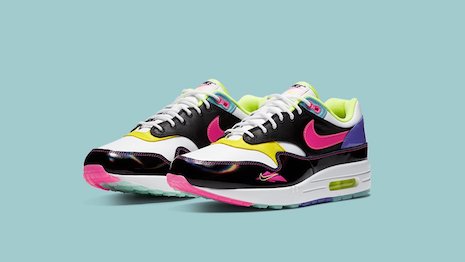- About
- Subscribe Now
- New York,
October 12, 2020

 The Air Max 1 "Hyper Pink." Image credit: Nike
The Air Max 1 "Hyper Pink." Image credit: Nike
In many instances, brand owners seek to control how and where their authorized dealers market their branded goods.
Particularly, many brand owners do not want their goods offered on platform sites such as Amazon and eBay, which they believe cheapens their brand. This is especially the case for luxury goods owners.
A recent decision by the Amsterdam Court of Appeal holds that Nike’s European affiliate could contractually bar an Italian distributor, Action Sport, from selling genuine Nike goods on Amazon.
An earlier similar ruling had been issued in a case involving Coty perfume, but some had argued that it was limited to luxury goods. The Dutch court rejected that asserted distinction.
What is the significance of this recent ruling for luxury goods companies? How would a U.S. court rule if faced with the same issue? And how should trademark owners decide what terms to require from authorized dealers and distributors?
Nike litigation
Nike European Operations Netherlands BV is the European affiliate of the Beaverton, Oregon-based sneaker and sportswear company. Action Sport was, until three years ago, an authorized Italian distributor of Nike products.
Nike terminated its Action Sport distributor agreement because, it claimed, the Italian retailer was offering authentic Nike products on Amazon, violating the terms of Nike’s Selective Retailer Distribution Policy.
In response Action Sports filed suit, arguing that Nike had breached their contract because prohibiting it from selling Nike products on Amazon’s marketplace violated European Union competition law, namely, Article 101(1) of the Treaty on the Functioning of the E.U.
But Action Sports lost both at the trial court level and before the appeals court.
One prior decision that was important to the outcome on appeal was an opinion issued in a German case filed by cosmetics manufacturer Coty against one of its authorized distributors, Parfümerie Akzente GmbH, for selling products via Amazon, in violation of Coty’s own distribution rules.
In the Coty case, the E.U. Advocate General made a preliminary finding that such restrictions were permitted. That finding was then affirmed in a binding decision by the European Court of Justice, which reasoned that such a ban is permissible in order to “preserve the luxury image of the goods.”
Action Sport argued that the Coty decision should be limited to luxury goods. That had some support from the German Federal Cartel Office, which has taken the same position.
On the other hand, the French Competition Authority relied on the Coty decision even in cases concerning non-luxury goods, allowing a garden equipment manufacturer to ban online sales.
The Dutch Court sided with Nike and held that any brand owner may restrict its authorized dealers as to where they can offer the branded products.
U.S. law
So, what would be the corresponding result under U.S. law?
As we have written before, U.S. trademark law generally allows anyone, authorized or not, to sell genuine goods. So once someone has legally acquired genuine product, they cannot be stopped from offering it for sale on any platform they wish.
U.S. trademark law also recognizes that use of a trademark to falsely imply or claim that one is an authorized dealer is a form of infringement.
As I have also written before, likelihood of confusion is the linchpin of any trademark infringement claim. Confusion need not be limited to confusion about a product. Confusion as to who sponsors a business is also a kind of confusion that can give rise to trademark infringement.
So, a trademark owner is permitted to have only selected “authorized dealers.” This is generally governed by a contract between the brand owner and the dealer. In exchange for meeting certain criteria, the brand owner grants the dealer the right to claim it is authorized.
Authorized distributor/retailer agreements can include many different terms: territorial restrictions, requirements as to how the product is to be displayed and advertised, service requirements, etc.
So long as the brand owner can articulate a reasonable basis for the restriction – connected to maintaining the brand image and goodwill – courts generally will uphold it.
So, it is very likely, if the same dispute between a trademark owner and an authorized dealer arose in the United States, that a court would side with the trademark owner.
Brand owners need to consider carefully what their policies are
While U.S. law, and now E.U. law, give more or less free rein to a brand owner to set policies, brand owners must still carefully consider what restrictions they wish to place on authorized dealers.
There is, on one hand, a delicate balance between maintaining brand image and maximizing sales, and, on the other hand, maintaining amicable relations with distributors and retailers.
While trademark law can provide a powerful enforcement mechanism to enforce this decision, it is ultimately a matter of business judgment as to what terms to require authorized dealers and distributors to adhere to.
Milton Springut is a partner at Springut Law PC, New York. Reach him at ms@springutlaw.com. Mr. Springut's opinions are solely his.
Share your thoughts. Click here